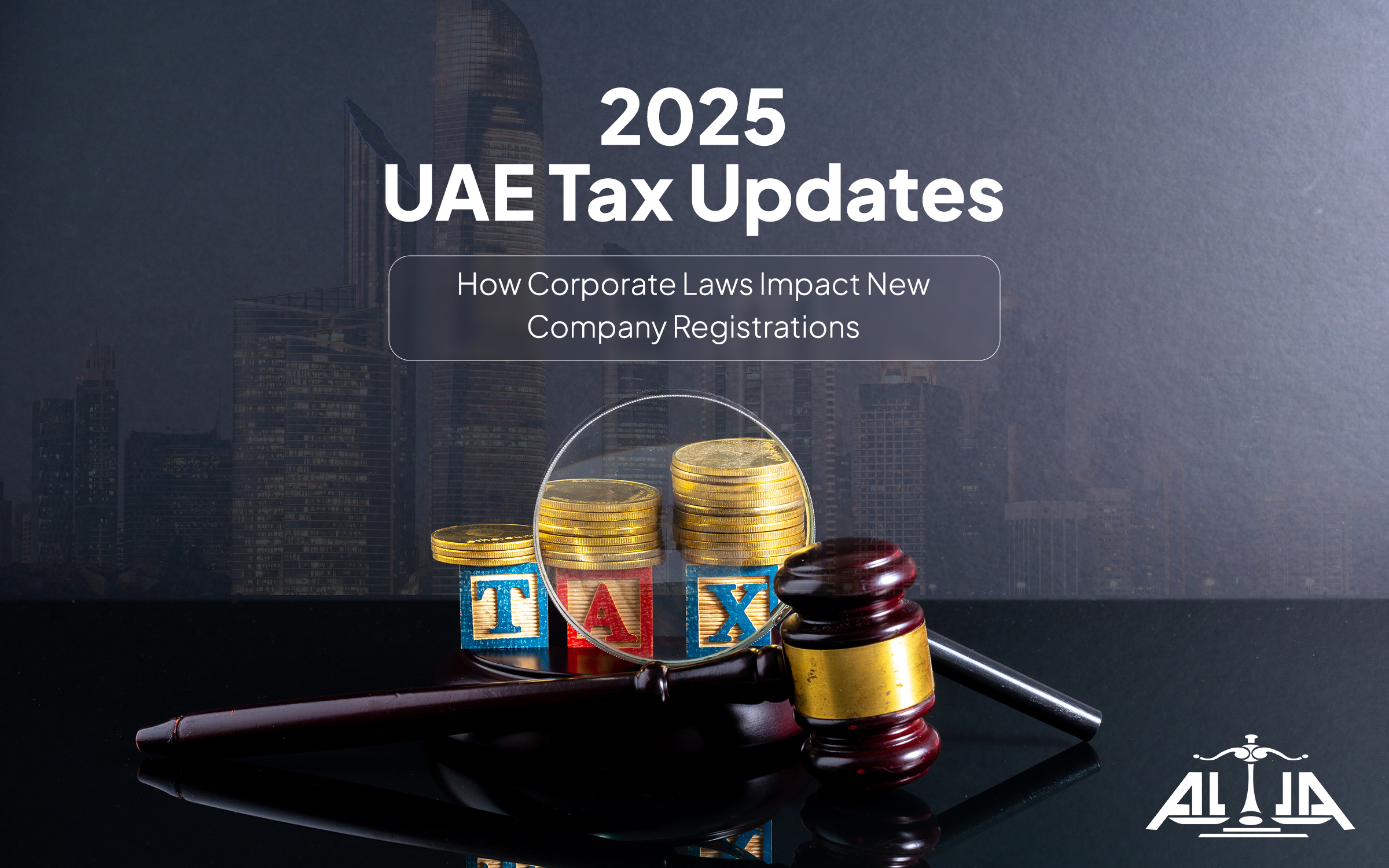As of January 2025, the UAE government has implemented significant changes in its corporate tax regime which has affected companies throughout the country. These corporate laws also impact the new company registrations in the region which is why you need to stay on top of these if you wish to start a business in UAE.

This blog shares useful insights into some of the recent tax updates that directly affect new businesses. So, if you wish to enter the dynamic market of the UAE then keep on reading till the end to know everything there is about the tax updates and their impacts on company registrations.
- UAE Corporate Tax Updates 2025
- Corporate Tax Rates
- Scope of the Corporate Tax
- Domestic Minimum Top-up Tax
- Entities Exempt from Corporate Tax
- Beneficial Ownership Disclosure
- Corporate Tax and Substance
- Company Registration Process in the UAE 2025
- Cost of Company Registration
UAE Corporate Tax Laws Updates 2025
Ever since the implementation of corporate tax in the UAE, the business landscape in the region has undergone a significant shift. The introduction of this tax was a strategic move that was introduced to diversify the economy as well as revenue streams and to align the region’s tax laws with global tax transparency standards.

The following sections deal with some important aspects of the UAE corporate tax laws in 2025 that directly impact new company incorporation so keep on reading till the end.
Corporate Tax Rates
- Businesses in the UAE with a taxable income of more than AED 375,000 must register for corporate tax at a rate of 9%.
- Businesses whose taxable supplies are no more than AED 375,000 are charged with 0% corporate tax.
The UAE tax update laws define two main categories of entities that need to register for the tax. These include
Non-Resident Taxable Persons: These include foreign entities that earn within the UAE but don’t have a permanent residence.
Resident Taxable Persons: These include entities that conduct business in the UAE’s mainland, free zones, or offshore areas. The registration deadlines for such businesses are determined based on their business license issuance.
Scope of the Corporate Tax
The UAE corporate tax applies to every business run by a legal entity or person in every Emirate. Businesses conducting operations in free zones, foreign entities conducting regular business in the UAE, banking operations, legal entities, natural persons doing business with a commercial license, etc., are all subject to corporate tax.
Domestic Minimum Top-up Tax
The UAE implements the Domestic Minimum Top-up Tax (DMTT) which requires multinational entities to pay a 15% minimal effective tax if their income exceeds AED 3 billion in at least 3 of the closing 4 financial years.

The tax was introduced to align UAE’s tax policies with OECD’s two-pillar solution and to maintain the region’s competitiveness in the global economy. The revenue generated from this type of tax is allocated to mega projects related to infrastructure, public services, and innovation.
Entities Exempt from Corporate Tax
According to the Ministry of Finance, the following are some entities that are exempt from corporate tax
- Salary and Compensations
- Capital Gains and Dividends
- Income from Shares or Securities
- Real Estate Investment by an Individual
- Charity Organizations
- Public and government entities
- Natural resources extracting companies
- Qualifying intra-group transactions and reorganizations provided that meet conditions specified in the corporate tax laws.
Beneficial Ownership Disclosure
In order to promote transparency and prevent financial crimes, both mainland and free zone companies have to file details of the ultimate beneficial owners with their concerned registrars.
The information provided should include
- Full legal name
- Nationality
- Identification documents
- Addresses
- Dates on which the person became (or ceased to be) a beneficial owner
This information is only accessible to designated government offices and there is no requirement to make it public. This is done to ensure transparency through accurate disclosures without violating the privacy rights.
In case, there have been some changes in the ultimate ownership, businesses have to notify the authorities within 60 days.
Corporate Tax and Substance
The recent corporate tax laws have also led to streamlined and relaxed rules governing the economic substance. Businesses now do not have to demonstrate economic substance for specific business activities.
Businesses in the free zones that seek a 0% tax rate must ensure they maintain their qualifying status by only engaging in permitted activities. The new and relaxed substance rules ensure new businesses have to face reduced administrative complexities.
Company Registration Process in the UAE 2025
1. First of all, businesses need to choose the type of company registration that meets their business needs. You can open the following types of entities in the region
- Mainland Company
- Free Zone Company
- Offshore Company
- Branch Office
- Representative Office
2. The next step is to determine the type of license your company needs based on its activities. Some common licenses are
- Trading License
- Industrial License
- Service License
- Tourism License
- E-commerce License
3. Next, you need to arrange the following documents to proceed with the registration.
- Passport copy and Visa (if applicable) of owners and shareholders
- Proof of address
- Business plan
- Memorandum and Articles of Association
- Certificate of Incorporation (for branch offices)
- Now you can choose business activities and then a company name following DED guidelines.
- After seeking approval from the DED you will proceed with acquiring the appropriate license.
- Finally, you can establish a bank account and register for tax (if applicable) with the FTA.
Cost of Company Registration
- The registration fee for opening a free zone company is between AED 10,000 – AED 50,000 while the annual renewal fee is AED 5,000 – AED 20,000.
- The registration fee for opening a mainland company is between AED 5,000 – AED 30,000 while the annual renewal fee is AED 3,000 – AED 15,000.
- The registration fee for opening an offshore company is between AED 5,000 – 10,000 while the annual renewal fee is AED 2,000 – AED 5,000.
Conclusion
The UAE tax laws give a lot of incentives for registering a new company. From relaxed taxes to foreign ownership rights and from greater flexibility in terms of business activities to business-friendly infrastructure this place has everything your new business needs to expand and grow.
However, at the same time, you also need to keep yourself aware of the latest UAE corporate tax laws and general regulations. Understanding these laws and their implications for new businesses can help you show compliance and avoid committing violations that can cost you dearly in terms of money and reputation.
You can visit us at Alawi Al Jabri to get the best company incorporation, licensing, and legal services all over the UAE.

